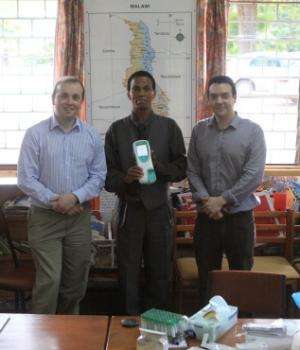First point of care blood test for heart disease in Malawi

A team of researchers from University College Dublin and Imperial College London have carried out a blood test for detecting early signs of heart disease for the first time in Malawi, Africa as part of a new research project for the management of type 2 diabetes.
When under stress, the heart releases a protein called a natriuretic peptide (NTproBNP), which can be used as a marker of cardiovascular disease in diabetes and other cardiometabolic conditions. The use of natriuretic peptides has been shown to be an effective method of targeting care and improving outcomes in people with risk factors for cardiovascular disease and heart failure.
In collaboration with the Faculty of Health Sciences in Mzuzu University, further research will be carried out to use this test to identify early cardiovascular disease in diabetes in Africa. The Irish researchers donated a point-of-care machine and testing strips to the university to augment training for local medical scientists and enable this initiative.
The Managing Type 2 Diabetes in Malawi, Africa (MTIMA) project is a collaborative effort between University College Dublin, Imperial College London, Mzuzu University, Ungweru (Malawi based community outreach NGO), Luke International Norway (Malawi based ICT NGO), and the Ministry of Health, Malawi.
During this project, Dr Chris Watson (UCD Conway Institute & School of Medicine & Medical Science) and Dr Joe Gallagher (UCD School of Medicine & Medical Science), together with Dr John O'Donoghue, Imperial College London, will establish electronic decision support systems in the community and point-of-care blood testing to enable treatment of diabetes in the primary care setting.
Educating communities, patients and healthcare workers on the prevention and treatment of type 2 diabetes will be an important goal. The project will also develop standardised medication packs to simplify the delivery of diabetes therapies in the community and widen access to effective care.
Currently, it is estimated that 347 million people worldwide suffer from diabetes with more than 80% living in low and middle-income countries. Sub-Saharan Africa will see a rise in incidence of diabetes from 12.1 million in 2010 to 23.9 million in 2030. Just like the developed world, 90% of diabetes patients in Sub-Saharan Africa have type 2 diabetes. The current prevalence of diabetes in Malawi is 5.6%.
According to Dr Chris Watson, the scale of the problem is apparent and the issue of accessing care locally leads to patients presenting late with complications and difficulties with accessing medications occur on a regular basis.
"A survey that we carried out in collaboration with the local community group, Ungweru in Mzuzu showed that although 96% of local healthcare workers had heard of diabetes and 83% knew someone with diabetes, no healthcare worker was aware of guidelines for the management of the disease.
65% of these healthcare workers had no access to a method to measure blood pressure and 26% felt that they would do nothing if they thought someone had diabetes as there were no facilities available to manage the disease. In this country of almost 16 million people, there is only one hospital that can test HbA1c, a vital marker of diabetes control.
Through the MTIMA project, we are committed to developing primary care based solutions using innovative technologies to deal with the issue. We will build on the success of the EU FP7 Supporting LIFE project led by Dr O'Donoghue and Dr Gallagher currently running in the Mzuzu area, which uses an electronic decision support system on mobile phones to improve the management of illness in young children in Malawi."
In Tumbuka, a Bantu language spoken in Malawi, Zambia and Tanzania, Mtima is the word for 'heart'. It is a fitting title for the project given that the vast majority of complications in type 2 diabetes relate to cardiovascular disease and Malawi is known as the 'warm heart of Africa'.



















